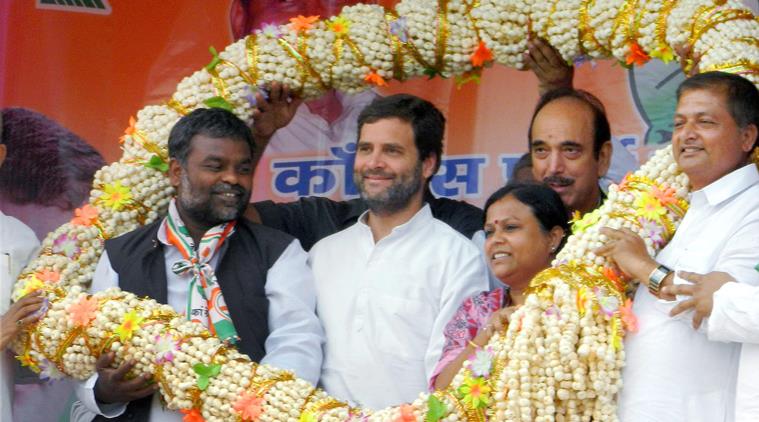Opinion The hope theory
Why television doesn’t show the crowds — or their absence — at Rahul Gandhi’s Bihar rallies
 Madhubani: Congress Vice President Rahul Gandhi is garlanded during an election rally in Madhubani on Thursday. PTI Photo (PTI10_29_2015_000297B)
Madhubani: Congress Vice President Rahul Gandhi is garlanded during an election rally in Madhubani on Thursday. PTI Photo (PTI10_29_2015_000297B)  Congress Vice-President Rahul Gandhi is garlanded during an election rally in Madhubani on Thursday. (Source: PTI)
Congress Vice-President Rahul Gandhi is garlanded during an election rally in Madhubani on Thursday. (Source: PTI)
Ever since modern democracy began taking baby steps in London and Washington a couple of centuries ago, political authority has had to grapple with a parallel arrival in the power games: The media. The media can be, and often is, many things: selective, objective, petulant, brilliantly effective or scandalously partisan, but conspiracy is not its forte. Journalists are simply too ferociously competitive to conspire. Media barons like the sniff of influence, but their preferred strength is the ability to mould opinion through reach; their principal wars are with one another. If you think they meet in some secret room to hatch a plot, wake up.
But this makes our question all the more intriguing. Why is just about every television news channel so reluctant to show the audience at Rahul Gandhi’s public meetings during this hyper election campaign for the Bihar assembly? Why do television cameras, fixed on Rahul Gandhi’s face and transmitting his words, pretend as if they cannot swivel?
One answer suggests itself. Television does not show crowds because there aren’t any crowds to show. But absence is also a story, as every trainee journalist knows. Could this be a case of pity, a touch of the “bechara” syndrome, not unmixed with the hope that someday the middle-aged leader of the Congress might find a voice?
Pity does not get you very far in journalism, but there is something to be said for the hope theory. Television thrives on contest. A mismatch is boring, and boredom is television’s deadliest sin. Television might need Rahul Gandhi even more than Rahul Gandhi needs television. Lalu Prasad is far better value than Rahul Gandhi, because he is always in the fray, armed with phrases, ready for a joust. But he is no substitute. A leader of a region within a province cannot fill the vacuum being created by a Congress disappearing across the country.
One of my favourite periodicals is The Spectator, published from London. Its views are often indigestible, but its style is exquisite and argument refined. It is, in the classical sense, a publication of manners, a weekly repository of delicious information that is happily useless for anything other than languid conversation. Where else would you learn, for instance, that the British stopped blubbing and developed their famed stiff upper lip only with the rise of empire because it was awfully important never to let natives see you get teary. If the brown coolie realised that the burra sahib was also human, it would obviously bring down the Raj. Apparently the British began to sob again only in the 1950s, after they lost India. I suppose they had every reason to, although they chose to cry at the movies rather than in history classrooms.
I was delighted to discover from the October 10 issue of The Spectator that it has induced a new phrase into the English language, invented by an occasional columnist, James Bartholomew. His creation was “virtue-signalling”, to describe how some people suggest a superior piety, without actually having done anything pious. You do not, therefore, give money to charity; you merely wear a charity ribbon. In earlier days, this was known as being sanctimonious, but I suppose the new term has its merits.
It is astonishing that the phrase has not yet entered Delhi’s discourse. Our British-Indian capital is a haven for the upwardly mobile, packed with groups that enjoy the prospect of high reputation purchased at low cost. Our socio-political elites could turn “virtue-signalling” into an art form, adding impressive range and subtly complex variety to this specialised method of communication.
Does virtue-signalling require a long face, though? In my considered view, this should be left optional. Anything compulsory is not very democratic, and we are, as we virtue-signal so often, the world’s largest democracy.
Do heroes have to be innocent in a democracy? We may have found one, in Hyderabad. K. Venkata Narayana sent a public-sector bank into a tizzy when he applied for a loan of Rs 5 lakh to contest an election. I shall not name the bank, because it has piled up countless crores in non-performing assets by handing out fat “loans” to fraudulent businessmen, but it cannot make up its mind about the validity of 28-year-old Narayana’s application. Narayana did not ask for a gift. Whenever electoral reforms are discussed, all the wise men hit a wall and return to status quo. Why not let this young man suggest what can be done? It may not be the end of the story, but it will be a start.
Akbar is an author and BJP Rajya Sabha MP





